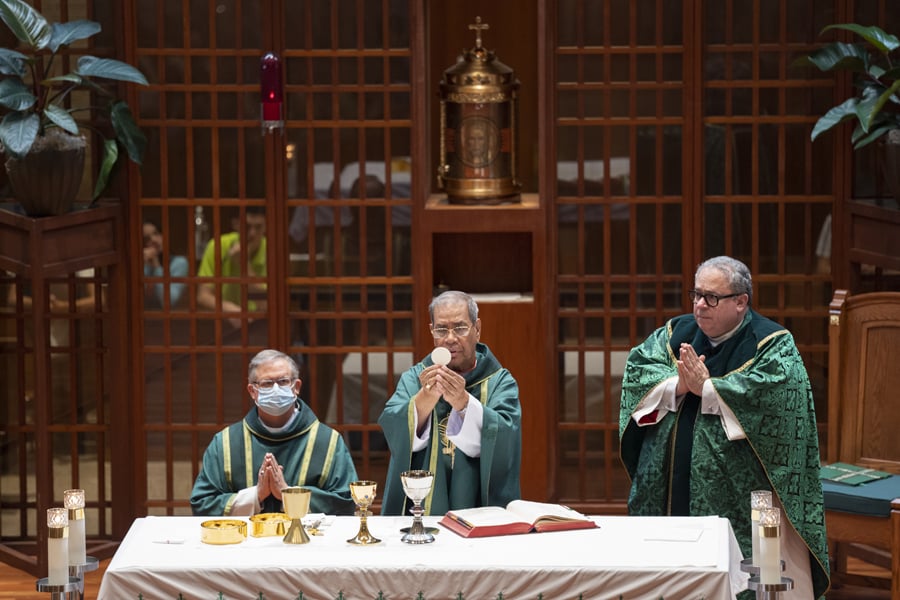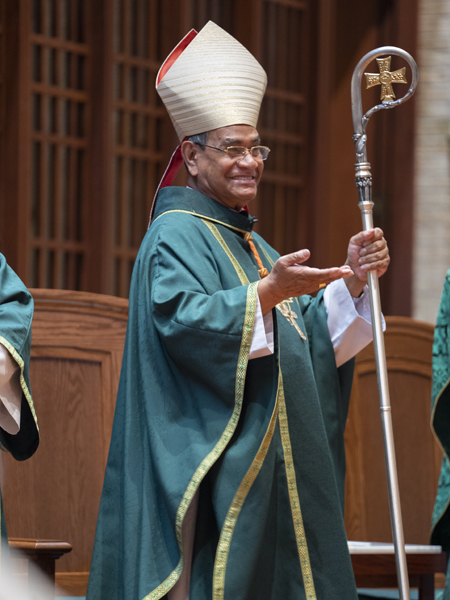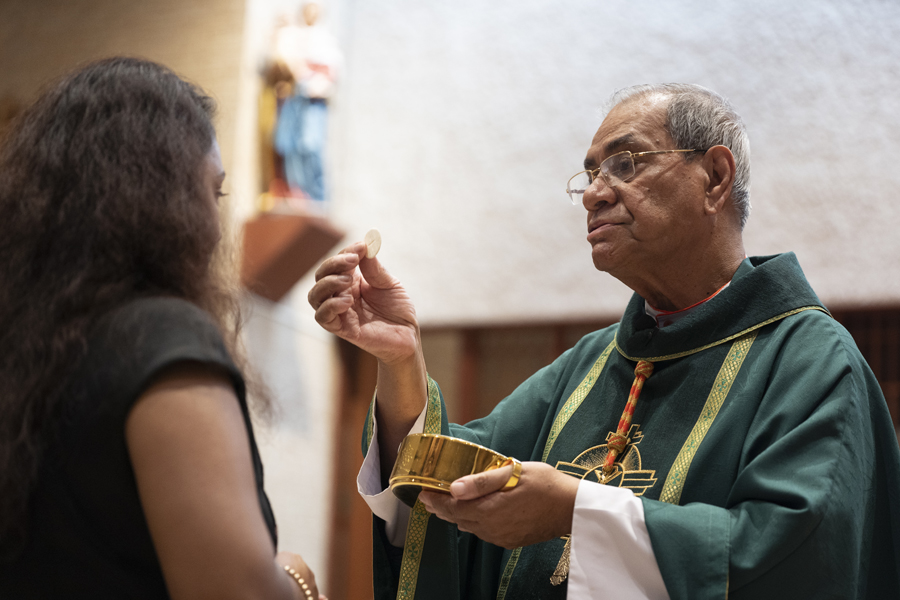Bangladesh Cardinal D’Rozario celebrates small numbers, big impact at St. Andrew Church

Cardinal Patrick D'Rozario, of the Archdiocese of Dhaka, Bangladesh, elevates the Holy Eucharist during Mass September 5 at St. Andrew Parish. (NTC/Jayme Donahue)
FORT WORTH – Bangladesh Archbishop Emeritus of Dhaka Cardinal Patrick D’Rozario, during a Sept. 5 Mass concelebrated with Fort Worth Bishop Michael Olson at St. Andrew Church, spoke of opportunities for small groups to make huge positive differences.
Cardinal D’Rozario knows of what he speaks.
Of Bangladesh’s roughly 170 million people, only about 400,000 — about 0.2 percent of the population, with Christians overall accounting for about 0.4 percent — are Catholic. Most of the country’s Catholics consist of members of minority tribes. Bangladesh is otherwise about 90 percent Muslim with a sprinkling of other religious denominations.
“We are a little flock in the midst of people belonging to other religions,” Cardinal D’Rozario said. “But we are proud of being small and being humble. We are proud of being a tiny little community because God works through us.”
Ordained as a priest in 1972, Cardinal D’Rozario became first Bishop of Rajshahi in 1990, and in 2011 he became Archbishop of Dhaka, Bangladesh’s economic, political, and cultural center. Pope Francis in 2016 elevated him to the rank of cardinal.
Pope Francis’ move surprised him initially, Cardinal D’Rozario said.

“But Pope Francis often goes out of the center and looks for people who are on the margins of the Church,” Cardinal D’Rozario said. “That’s a recognition of the Church, not a person. An opportunity for us to pray in the midst of a sea of people belonging to other religions. It’s a recognition but at the same time a sending out for mission.”
Outreach and harmony are the goals of the Church in Bangladesh, Cardinal D’Rozario said, including outreach and aid to majority Muslim refugees fleeing Burmese persecution.
The cardinal likened the Archdiocese’s mission to that of Mother Teresa, saint of the poor.
“Reminding that Jesus is so close to us,” Cardinal D’Rozario said. “That working toward being the saint of poverty, holiness, being little and small, that is what He is telling us to do.”
Although Bangladesh has a tradition of harmony among religious groups, persecution exists, Cardinal D’Rozario said, though social and economic issues fuel the bulk of division.
Along with Cardinal D’Rozario, Caritas Bangladesh Programs Director James Gomes visited Fort Worth. Gomes, after the Mass, described Caritas as the Church’s social arm in Bangladesh through responding to emergencies and natural disasters in a spirit of “true Catholic relief service.” He also shared about Pope Francis’ 2018 visit to Bangladesh, where Gomes introduced him to a group of Rohingya refugees.
The pair also visited Ohio and California on their trip to the U.S. Although Bengalis are plentiful in America only a small percentage are Catholic. The Diocese of Fort Worth, Bishop Olson said, has 15 families.
Bishop Olson praised the work of Cardinal D’Rozario and Caritas Bangladesh.
“The Cardinal comes from a community that is very small but very much serves as a leaven for peace, interfaith conversation, and understanding,” Bishop Olson said. “In keeping with the Bengali culture, they do a lot of outreach and education for the poor, which they see as their responsibility as Catholics to reach out through living the Gospel of Jesus rather than turning inward out of fear.
“One might be tempted to think that, with such a small minority, they would be frightened and turning inward, but quite the contrary is true of the Church in Bangladesh,” the bishop said. “That’s in no small part due to Cardinal D’Rozario’s leadership, and in he and others generously offering their lives for the sake of truth and for the sake of God’s compassion and love.”
Cardinal D’Rozario said he’s made several trips to America both as a bishop and archbishop. The Cardinal estimated that about 8,000 Bengali Catholics live in America.
The goal, he said, is outreach and communication between Bengalis living here and their homeland.

Cardinal Patrick D'Rozario, of the Archdiocese of Dhaka, Bangladesh gives Holy Communion to a woman during Mass September 5 at St. Andrew Parish. (NTC/Jayme Donahue)
“I had Mass yesterday with a family of 35 people and enjoyed sharing with and answering their questions after,” Cardinal D’Rozario said. “In California, we will have 150 Catholics gathering together and I will celebrate the Eucharist with them too. It’s like the work of migrants in that the Bengalis here and in Bangladesh should have some touch with each other. I always like to come here to meet Christians who came here and celebrate the Eucharist with them. I encourage them to see their stay here as a candle and [part of God’s] divine plan rather than simply for socioeconomic reasons.”
